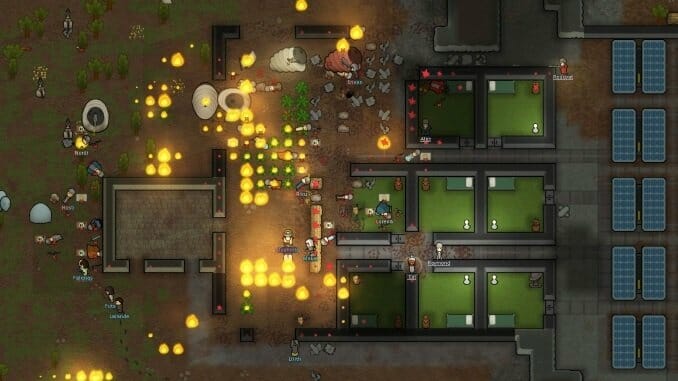Rimworld‘s Focus on Happiness Is a Refreshing Change-Up for the Base-Building Genre

I was certain that my ninth and longest-lived Rimworld colony was doomed when Sweetpea fell ill with mechanites and collapsed in a corn field. The little nanobots had taken hold of her muscular system, giving her superhuman strength at the cost of being in constant pain. Sweetpea was the backbone of my colony, throwing up entire buildings in a matter of minutes and harvesting crops as if winter was perpetually right around the corner. Now she could hardly get out of bed and was stuck in the ramshackle hospital she had finished just days before.
Everything I knew about base building games was telling me it was time for a restart. The colony was set to slowly wither away, just as the last eight had. But to my surprise, the daily lives of all my colonists went on with minimal changes. My colony didn’t enter a decline, but rather a period of adjustment that everyone made it out of. That’s when I realized that, in a genre that prioritizes ruthless efficiency above all else, Rimworld stands out in letting players strive for their own ideal version of what a society should be and value.
There are a number of systems in the game that promote this playstyle. Every colonist has a set of needs that must be met on a daily basis. The basic needs like food and sleep are there, but so is the rest of the hierarchy. One of the first structures the game’s tutorial has you build is a horseshoe pit to give your colonists a place to hangout after work. If your characters don’t get enough time to relax, they’re liable to break down and go rogue.
But the colonists aren’t just concerned about their own needs; they care about the wellbeing of people in general. If an innocent prisoner dies, every character’s mood will be negatively affected—even more so than if one of their fellow colonists dies. Like a proper simulation game, Rimworld allows the player to exert a questionable level of control over characters. You can harvest a prisoner’s organs for later transplanting or even sell them into slavery. Unlike other games, however, Rimworld forces the player to ask themselves if they’d be happy doing either of those things, and provides real consequences.
It may seem like the general valuing of human life would be an obvious motif to bake into a game attempting to simulate society, but it could have been easily overlooked. Very few strategy and simulation games ask the player to consider the ramifications of their actions. This sort of devaluing is most apparent in the SimCity games. When developer Will Wright got serious about turning his map editor into the first SimCity, he turned to a book by Jay Forrestor called Urban Dynamics. The book sought to explain the rise and fall of cities via a series of mathematical equations, a number of which Wright implemented into his game.